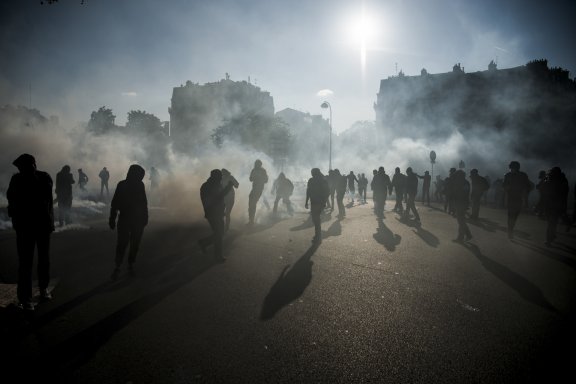3 & 4.12.21
CN D à Pantin
Avec Elsa Dorlin, Kaoutar Harchi, Elisabeth Lebovici,
Olivier Neveux, Catherine Malabou, Hervé Mazurel,
Gisèle Vienne, Sandra Lucbert
How does one work on violence? How does one put it into perspective, into a scene, into a story; how does one break it down?
How can one restore its logic and the tricks that disfigure or disguise it – making it unrecognisable, acceptable or harmless for some? Is it possible to restore its complexity, its historicity? From what point of view?
How does one grasp violence and its scales in their raw reality: in what it does, in what it does to us, while remaining true, in homage to what we no longer are, to what we have become, as well as to the memory of all those whom violence kills, damages or debilitates, in silence, rendering them voiceless, amnesic or unbalanced, whom it denounces as insignificant or, strictly speaking, barbarian?
Is writing, reflecting on, representing and choreographing violence, situating oneself within it, looking at it straight in the face or from an angle, approaching it from the rear, a way of surviving it, of saving oneself, repairing oneself and taking care of oneself? Striking it down, fighting it, revealing its mechanics, denouncing its cogs and pitfalls – are these all ways of catching one’s breath, taking one’s body back, of making history, of remaking the world or of reforming life? Are these political actions?
During this two-day event, the aim is to bring together and discuss studies on the subject of violence, all of which reflect on its objectification from the meanders of the so-called “unhistorical”; from biography , which is always already “political”, from sensory, muscular lived experience, from the memory and the chorus of bodies and senses, from the library of emotions and imaginaries, from the surging energy of struggles, from the cultures that have been buried and covered up, from the lives that have been stymied. Philosophers, historians, writers and artists confront and criticise historical and perceptual frameworks (what is visible, what is audible?), the language, narratives and figurations of the masters as the coordinates of normal, liveable and intelligible lives. They study the violence that is woven into and through class antagonisms, that which, steeped in sexuality and structured by race, affects us, infects us and constitutes us, damages us and leads us astray, disorientates us as subjects of knowledge, as heralds of meaning, as visionaries and as historical realities.
To analyse, chronicle, pass judgement on and criticise violence is to reason by dissonance, to thwart, undo, deconstruct and, in return, to fabricate perceptions, consciousnesses, concepts and visions from the bottom up, from the ground, from inner worlds, like so many moments of historical positivity and densities of the flesh; it is to open, relay and revive conflict.
Over the course of these two days, we will seek to grasp this know-how inherent to contemporary criticism, to map it, to speak about the arts of the everyday, of flesh and fiction, the art of concept, of languages and of life, the art of narrative, of archives and of choruses, of establishing an inventory of the weapons amassed, of the forces gathered. In philosophy, in history, in the history of art and contemporary creation, in literature and with sociology, what do the critiques of violence teach us?
